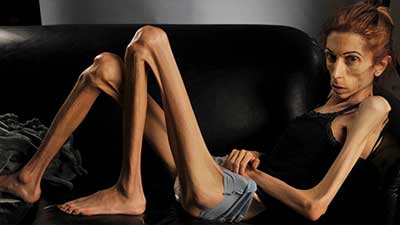Introduction
Anorexia, or anorexia nervosa, is a complex eating disorder characterized by an intense fear of gaining weight and a distorted body image. Individuals with anorexia often strive for excessive thinness, leading to self-imposed restrictions on food intake and unhealthy weight loss practices. It is crucial to understand the symptoms associated with anorexia to identify the disorder early and prevent its progression.
What is Anorexia?
Definition
Anorexia nervosa is a psychiatric disorder that affects both the mind and body. It involves a deep-rooted fear of weight gain, leading individuals to adopt restrictive eating habits that result in extreme weight loss. This fear of gaining weight is often disproportionate to their actual body size or weight.Causes
The causes of anorexia are multifactorial and can include genetic, environmental, and psychological factors. Certain personality traits, societal pressures, family history, and traumatic life events can contribute to the development of anorexia. However, it is important to note that each individual’s experience with anorexia is unique, and not everyone may have the same set of causes.
Recognizing Anorexia Symptoms
Early recognition of anorexia symptoms is crucial for timely intervention and treatment. While each person may exhibit a unique combination of symptoms, there are common indicators to be aware of:Physical Symptoms
- Significant weight loss or being underweight for one’s age and height
- Emaciated appearance with visible bones
- Abnormal or absent menstrual cycles in females
- Sensitivity to cold temperatures and constantly feeling cold
- Fatigue, weakness, and lack of energy
- Dizziness or fainting spells
- Dry and brittle hair and nails
- Pale or yellowish skin
- Fine hair growth all over the body (lanugo)
Behavioral Symptoms
- Obsessive preoccupation with food, calories, and weight
- Strict food rituals, such as cutting food into tiny pieces or arranging it meticulously on the plate
- Avoidance of social situations involving food
- Excessive exercise routines, even when fatigued or injured
- Frequently checking one’s body weight and body shape
- Engaging in secretive eating patterns or hiding food
- Irritability and mood swings related to food and body image
Emotional Symptoms
- Intense fear of gaining weight or becoming fat
- Distorted body image, perceiving oneself as overweight despite being underweight
- Low self-esteem and self-worth based on body shape and weight
- Feelings of guilt, shame, and disgust after eating
- Anxiety and depression
- Social withdrawal and isolation

The Impact of Anorexia
Anorexia nervosa can have severe consequences on various aspects of an individual’s life.Physical Impact
The physical effects of anorexia can be devastating. Severe malnutrition can lead to muscle wasting, weakened immune system, organ damage, and even cardiac complications. Nutrient deficiencies can cause electrolyte imbalances, osteoporosis, and hormonal disturbances.Psychological Impact
Anorexia deeply affects an individual’s psychological well-being. The constant obsession with food and weight can lead to anxiety disorders, depression, and obsessive-compulsive tendencies. Individuals with anorexia may experience feelings of worthlessness, inadequacy, and a distorted sense of self.Social Impact
Anorexia can strain relationships and isolate individuals from their social circles. The disorder’s secretive nature and avoidance of social situations can lead to a breakdown in communication and a loss of support. Friends and family may struggle to understand the complexity of anorexia, causing further strain on relationships.
Seeking Help and Treatment
Timely intervention and appropriate treatment are crucial for individuals with anorexia. A comprehensive approach involving medical professionals, mental health experts, and support networks is essential.Medical Intervention
Medical professionals play a vital role in managing the physical complications of anorexia. They monitor the individual’s health, address nutritional deficiencies, and ensure their safety during the refeeding process. In severe cases, hospitalization may be necessary.Therapeutic Approaches
Therapeutic interventions, such as psychotherapy and counseling, are essential in addressing the underlying psychological factors contributing to anorexia. Cognitive-behavioral therapy (CBT) and family-based therapy (FBT) have shown positive outcomes in treating anorexia. Support groups and peer support can also provide encouragement and understanding during the recovery journey.
Supporting Someone with Anorexia
Support from friends and family is crucial for individuals struggling with anorexia. Here are some ways to offer support:Communication and Empathy
Approach conversations with empathy and understanding, creating a safe space for open dialogue. Listen actively and avoid judgment or criticism. Encourage open discussions about their feelings, struggles, and aspirations.Encouraging Professional Help
Urge the individual to seek professional help and accompany them to appointments if needed. Offer assistance in researching treatment options and connecting them with appropriate resources. Be patient and understanding, as recovery takes time.Magnesium vs GABA: Which is Better for Sleep?
Conclusion
by this debilitating disorder. Anorexia nervosa is a serious condition that requires a comprehensive approach, including medical intervention, therapy, and support from loved ones. By understanding the physical, behavioral, and emotional symptoms of anorexia, we can provide the necessary support and encourage individuals to seek treatment. Remember, recovery from anorexia is possible with early intervention and a supportive network. With professional help and the love and understanding of friends and family, individuals can regain their physical and mental well-being.Are Gastroesophageal Reflux Disease Symptoms Similar to Anorexia Symptoms?
Gastroesophageal reflux disease symptoms explained may include heartburn, regurgitation, and difficulty swallowing. In contrast, anorexia symptoms involve a distorted body image, excessive weight loss, and fear of gaining weight. While both conditions can affect eating patterns and cause discomfort, their symptoms differ significantly, emphasizing the importance of accurate diagnosis for effective treatment.
IntroductionWhat is Anorexia?DefinitionCausesRecognizing Anorexia SymptomsPhysical SymptomsBehavioral SymptomsEmotional SymptomsThe Impact of AnorexiaPhysical ImpactPsychological ImpactSocial ImpactSeeking Help and TreatmentMedical InterventionTherapeutic ApproachesSupporting Someone with AnorexiaCommunication and EmpathyEncouraging Professional HelpConclusionAre Gastroesophageal Reflux Disease Symptoms Similar to Anorexia Symptoms?FAQsWhat are the long-term effects of anorexia?Is anorexia only prevalent in young females?How can I approach someone I suspect may have anorexia?Can anorexia be cured completely?Where can I find support for individuals with anorexia?





